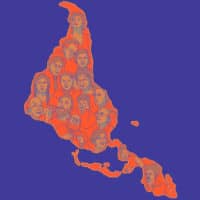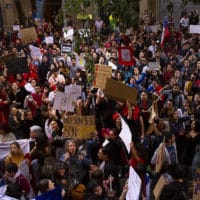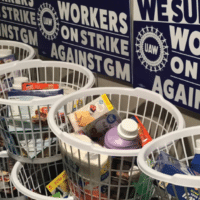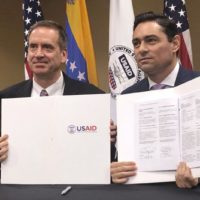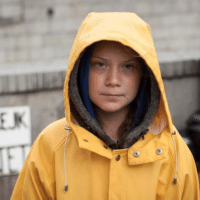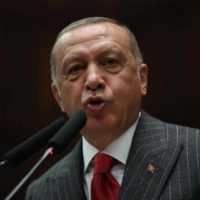-
Nazi-normalizing barf journalism: A brief history
The article was met with howls of protest across Twitter, but among the many apt responses, Bess Kalb’s description (11/25/17) captured my heart and gave me the single most useful phrase of the Trump era: “Nazi-normalizing barf journalism.”
-
Dossier 22: Latin America and the Caribbean: between the neoliberal offensive and new resistances
Critical thought in our current political conjuncture faces a debate about the characteristics of the neoliberal and neofascist offensive and the challenges that these offensives raise. This debate engages three important dimensions: the character of contemporary capitalism, the new monsters that drive it, and the possibility of necessary alternative futures.
-
The political tide sweeping South America won’t accept predatory capitalism
The slogan is pithy—Neoliberalismo nunca más (Neoliberalism Never Again). It was chanted in the streets of Santiago, Chile; it was drawn on the walls in Buenos Aires, Argentina; and in a more sober register, it is mentioned in a seminar in Mexico City, Mexico.
-
Election rollercoaster
Germany is really riding a rollercoaster these days, but this is no amusement park; there’s lots of suspense but rarely joy – and quite a few politicians are very unwell! Not only politicians!
-
Western progressives and the imperialist Inquisition
Military curfews or states of siege have been imposed recently in Guatemala, Ecuador and Chile, with the army deployed to control protests. Western powers give these countries’ right wing governments the benefit of the doubt despite them being guilty as charged.
-
There’s something that’s ours on those streets and we’re going to take it back
In Lebanon, it was a tax on the use of WhatsApp; in Chile, it was the rise in subway fares; in Ecuador and in Haiti, it was the cut in fuel subsidies. Each of these conjunctures brought people to the streets and then, as these people flooded the streets, more and more joined them.
-
What the Chicago Teachers Union and United Auto Workers strikes teach us
The strikes have enabled the workers to feel their real strength. These two strikes give us a sign of the role the trade unions, the most powerful organizations of working people, will play in the future.
-
United States foreign policy: yesterday, today, and tomorrow
Mapping out the connections between the initiation of the permanent war economy, the drive for US empire, and today’s factional disputes and similarities among political elites.
-
USAID funds salaries of Venezuelan politicians as it doubles down on the coup
The payment of Mr. Guaidó’s representatives is a serious conflict of interest. Does the Guaidó team represent the Venezuelan people or the interests of the government that is paying their salaries? It is a point worth reiterating: a foreign politician is being paid by the United States to influence policy in the United States.
-
Thoughts on impeachment
The main impeachment thrust aims at minor events in the Ukraine. The whole approach ignores, indeed covers over the fact, that the whole U.S. policy of violently turning the Ukraine into a U.S.-dominated satrapy and advanced base was achieved by a Democratic administration.
-
Ireland is a racket (for foreign capital)
For 60 years Ireland has based its economy on attracting in foreign direct investment. And what’s has it got to show for it? One of the highest per capita national debts in the world and one of the highest rent regimes in the world.
-
Dossier 21: The neoliberal attack on rural India
If human agency, driven by a model of economics and development gone berserk, is a major driving factor in the changes upon us, there is plenty to be learned from this region and many like it.
-
The IMF convenes in Washington, deaf to the suffering it causes across the planet
No one within the IMF meeting will raise the question of democracy, both in terms of the IMF’s own functioning and in terms of the IMF’s relationship with sovereign countries around the world.
-
Hands off Greta Thunberg!
Defenders of capitalism, joined by some on the left, are attacking the young woman who has become the symbol of a mass movement. Our place is by her side.
-
The Berlin Wall thirty years later
Even thirty years have not accustomed all ex-GDR citizens to seeing youngsters in the streets with their ragged dogs and paper cups for charitable donations, concert violinists begging money with Mozart in cold subway stations or, on icy nights, homeless huddled figures in sleeping bags on the stations’ concrete floors.
-
What to expect from Turkey’s coming invasion of Syria
Erdogan’s government is preparing to enter Syria for a major military operation against the Syrian Democratic Forces (SDF), which is made up largely of Kurdish factions who set up this armed force to defend the mainly Kurdish enclave in northern Syria.
-
Capitalism ‘solves’ the Nitrogen Crisis: A brief history
Part Three of Ian Angus’s examination of the disruption of the global nitrogen cycle by an economic system that values profits more than life itself.
-
What media like best about Elizabeth Warren: She’s not Bernie Sanders
If Warren ever finds herself without media’s bête noire to draft off of—assuming her policy stances remain the same—the media headwinds can be expected to get much more intense for her.
-
Playing the Trump card
Clearly, the ingredients of anti-Trump cooking create a very mixed batter. Some spoonfuls may even contain a “Save Biden as candidate” flavor, outweighing the truly weighty reasons for baking a completely new kind of cake.
-
iPhone workers today are 25 times more exploited than textile workers in 19th Century England
A recent report by the International Labour Organisation shows that the total global labour force is now measured at 3.5 billion workers. This is the largest size of the global labour force in recorded history. Talk of the demise of workers is utterly premature when confronted with the weight of this data.


